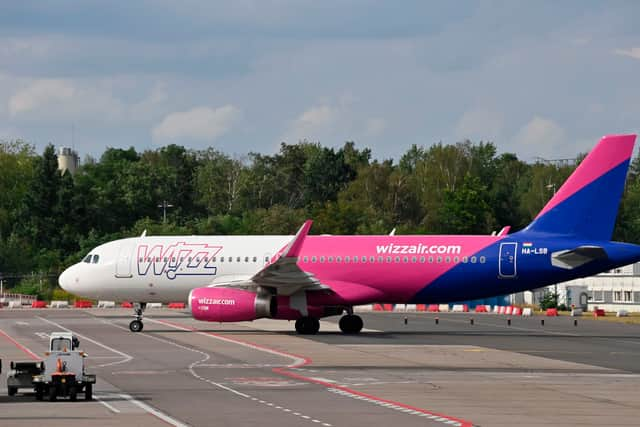Wizz Air accused of pushing ‘burnt out’ pilots to fly - putting holidaymakers at risk
and live on Freeview channel 276
Wizz Air has been accused of pushing its pilots to fly planes when they are “burnt out” and thinking they won’t “be able to manage the whole flight safely”.
A former Wizz Air pilot told MailOnline that airlines “tend to keep a lot of things very secret” and they “try to get what they legally can out of their staff”.
Advertisement
Hide AdAdvertisement
Hide AdHe added that he took three separate days off in one month because he didn’t trust himself at the controls of a Wizz Air passenger plane.
Current and former Wizz Air pilots, speaking on the condition of anonymity, also revealed to MailOnline that the company encouraged staff to fly extra hours to boost their income by paying them a meagre basic salary.
It comes after the boss of Wizz Air told staff in a meeting last year that pilots must push through fatigue.
József Váradi, CEO told employees that too many of them were taking time off for fatigue, and that “sometimes it is required to go the extra mile.”
Advertisement
Hide AdAdvertisement
Hide AdA spokesperson for Wizz Air at the time said that the comment was directed at all airline workers, rather than pilots specifically.


Pilot fatigue is taken seriously in the industry, with the Flight Safety Foundation calling it an” internationally recognized issue related to the broader issue of fitness for duty”.
The maximum flying hours for a commercial pilot is 900 hours of flight time in any calendar year.
Flying hours don’t include all the time pilots are working, only when they are actually in the air. Their other hours are also regulated and include when pilots check into the airport to start pre-flight duties and after landing.
Advertisement
Hide AdAdvertisement
Hide AdThe Civil Aviation Authority (CAA), whose job is to regulate UK airlines and make sure they follow the relevant safety regulations, said on their website that “individual pilots have a constant duty to monitor themselves and declare whether or not they are fit to fly”, adding that fatigue was “recognised in the 1950s” as a contributory factor in “some aircraft accidents”.
When approached by MailOnline about the claims made by current and former Wizz Air pilots, the CAA did not comment about the specific allegations.
A former pilot for Wizz Air told MailOnline his basic salary was £28,000, but for the airline he flies for now he receives £75,000 - more than two and a half times what he earnt before.
He said one way to relieve pilots is paying them a higher basic salary and removing the need to fly more hours.
Advertisement
Hide AdAdvertisement
Hide AdHe revealed that last year Wizz Air was so short-staffed in certain British airports that it paid pilots £117-a-day to work at them - despite employees racking up sleep debt and fatigue.
The pilot claimed he was never directly pressured to fly but he quit Wizz Air and moved to a different airline this summer due to how low he was being paid for the amount he was flying.
A Wizz Air spokesperson told MailOnline that the allegations are “baseless” and the “facts are that Wizz Air complies with all Flight Time Limitations as set by law and is regulated in the UK by the Civil Aviation Authority and in Europe by the European Aviation Safety Agency.”
The spokesperson added: “Both regulatory authorities are satisfied that Wizz Air maintains safe operations within the regulations, while the Wizz Air Operator Certificate is reviewed continuously.
Advertisement
Hide AdAdvertisement
Hide Ad‘Wizz Air promotes an open culture where we encourage our employees to speak up and tell the company’s management their opinions and share their views. The safety of our employees and passengers has always been and remains Wizz Air’s highest priority.”
A spokesperson for the European Union Aviation Safety Agency told NationalWorld: “EASA recognises that fatigue can be a serious safety hazard and needs to be identified and properly mitigated. Wizz Air prepared actively its summer 2023 operations according to the guidance provided by EASA in the SIB 2023-05 on “Possible Risks Emerging During Summer 2023.
“Thanks to this, the operational robustness has improved. EASA nonetheless remains vigilant in its oversight on all issues related to safety.”
The spokesperson added: “The report refers to comments made by Wizz Air pilots. If individual pilots wish to make a formal report to EASA, they can do so through our confidential safety reporting service https://www.easa.europa.eu/en/confidential-safety-reporting.”
Comment Guidelines
National World encourages reader discussion on our stories. User feedback, insights and back-and-forth exchanges add a rich layer of context to reporting. Please review our Community Guidelines before commenting.
